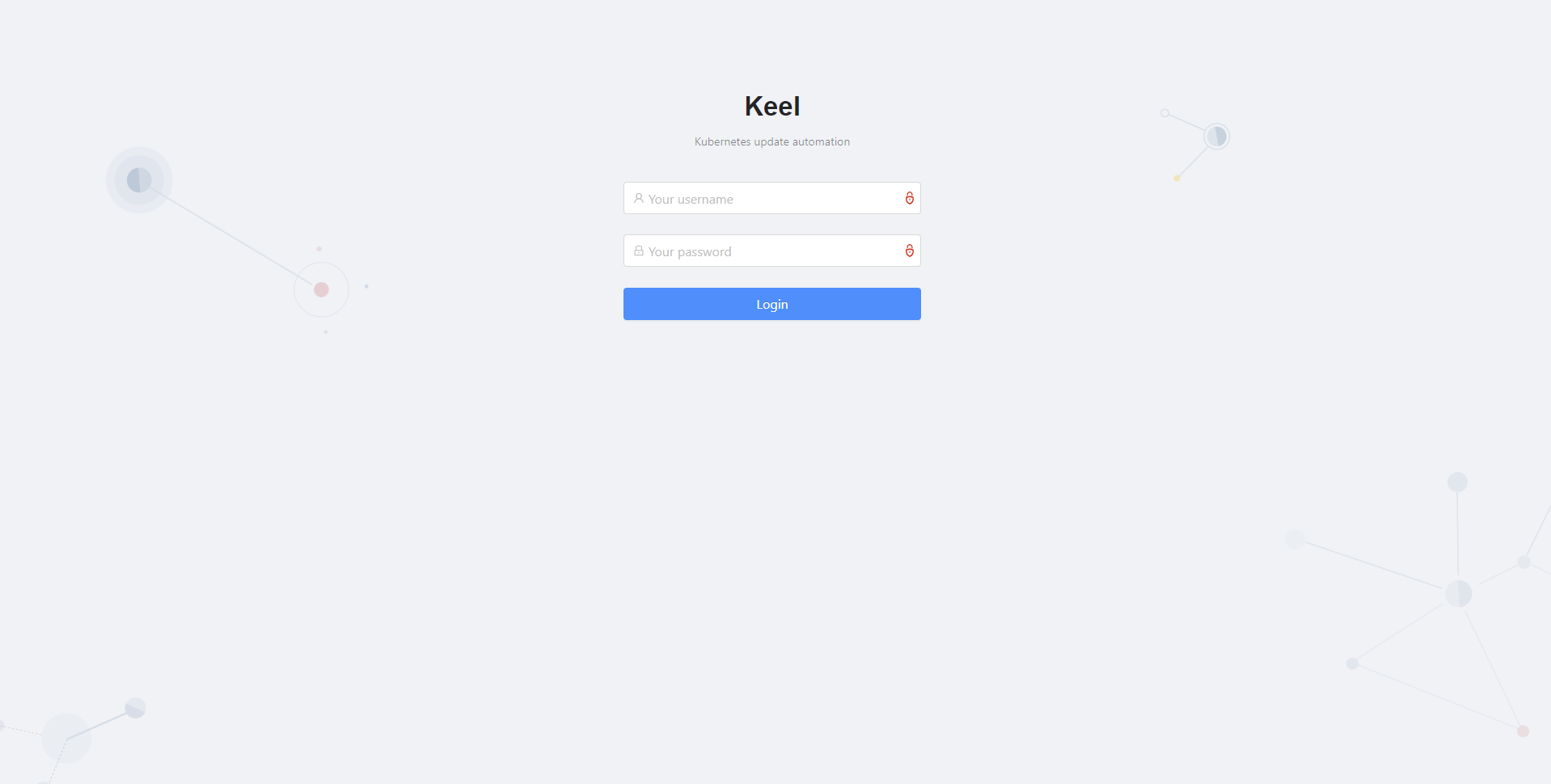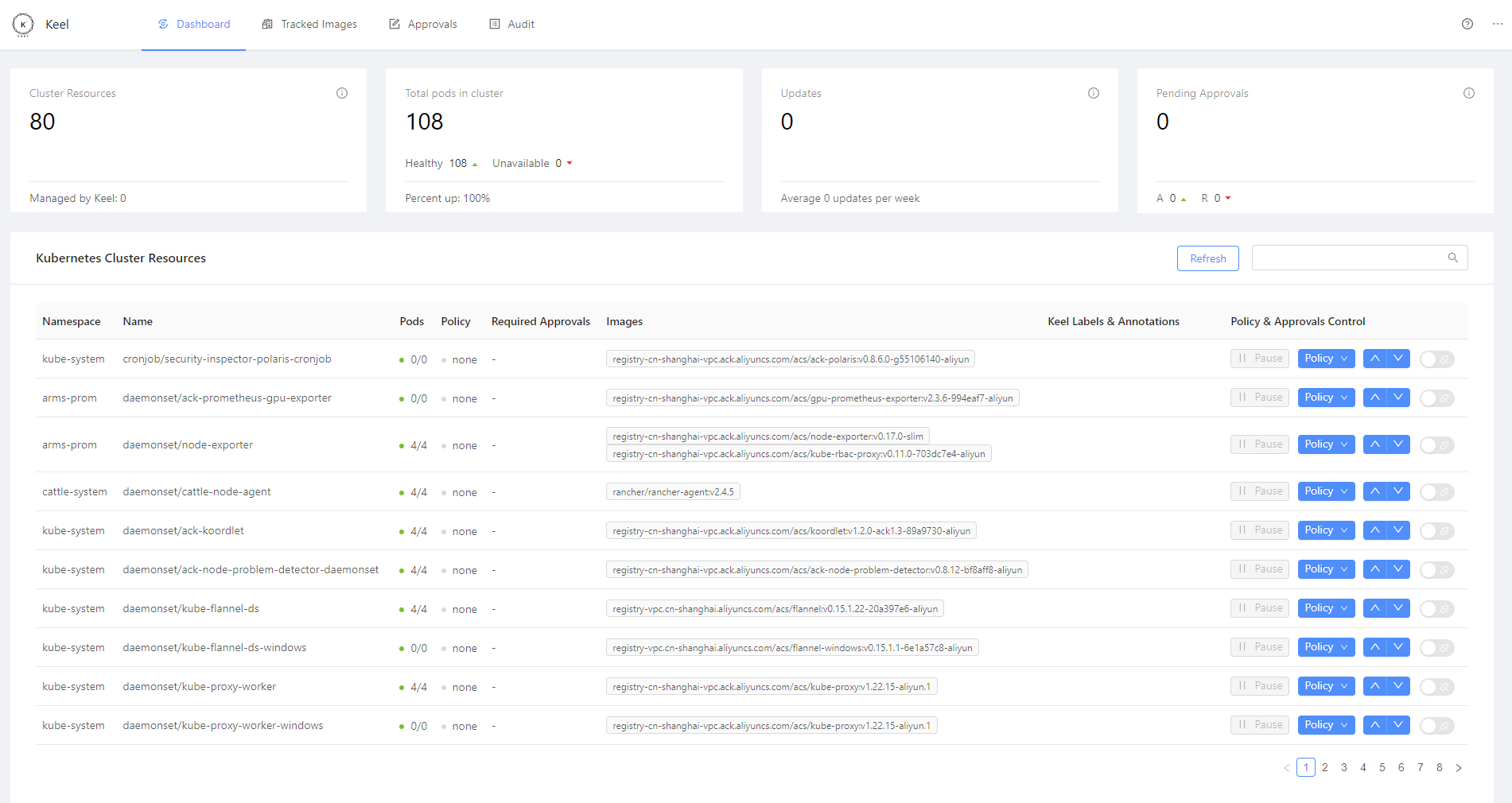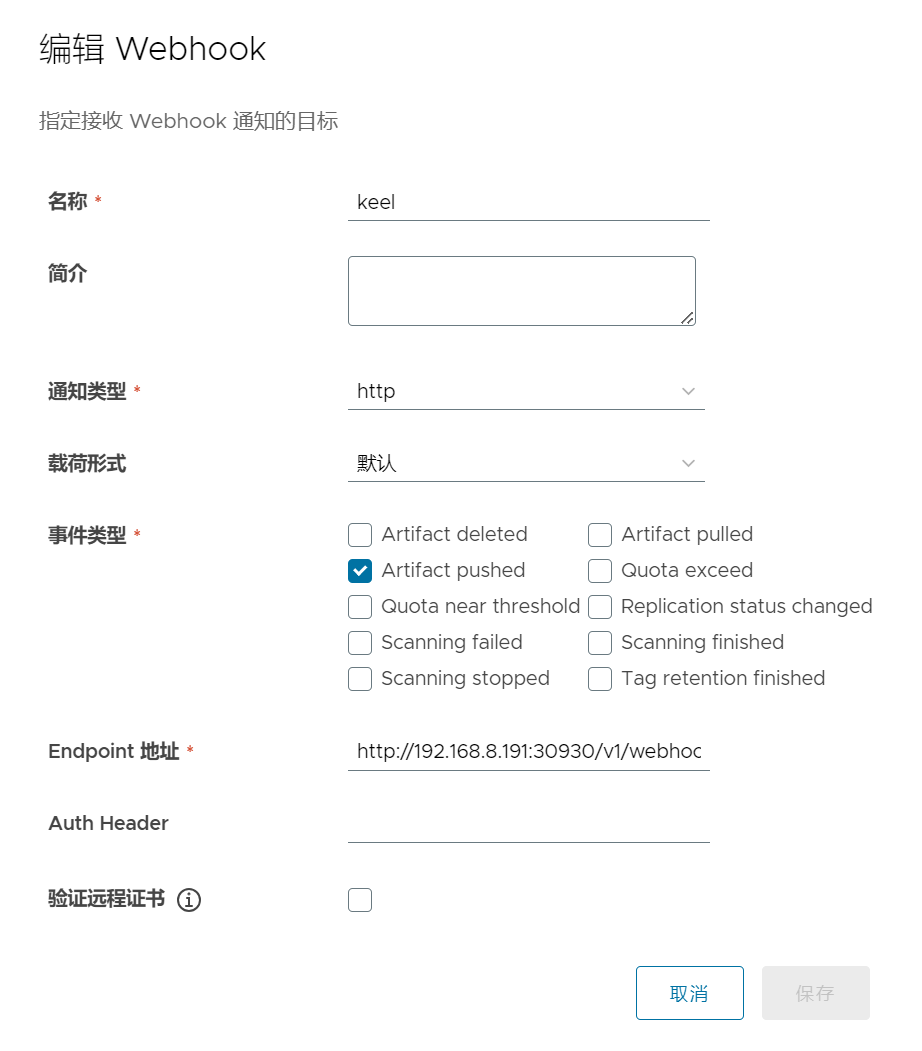Kubernetes部署keel
keel介绍
Keel旨在成为一种简单、健壮的后台服务,可以自动更新 Kubernetes 工作负载,以便用户可以专注于重要的事情
部署
使用yaml文件部署
---
apiVersion: v1
kind: Namespace
metadata:
name: keel
---
apiVersion: v1
kind: ServiceAccount
metadata:
name: keel
namespace: keel
labels:
app: keel
---
apiVersion: rbac.authorization.k8s.io/v1
kind: ClusterRole
metadata:
name: keel
rules:
- apiGroups:
- ""
resources:
- namespaces
verbs:
- watch
- list
- apiGroups:
- ""
resources:
- secrets
verbs:
- get
- watch
- list
- apiGroups:
- ""
- extensions
- apps
- batch
resources:
- pods
- replicasets
- replicationcontrollers
- statefulsets
- deployments
- daemonsets
- jobs
- cronjobs
verbs:
- get
- delete #required to delete pods during force upgrade of the same tag
- watch
- list
- update
- apiGroups:
- ""
resources:
- configmaps
- pods/portforward
verbs:
- get
- create
- update
---
apiVersion: rbac.authorization.k8s.io/v1
kind: ClusterRoleBinding
metadata:
name: keel
roleRef:
apiGroup: rbac.authorization.k8s.io
kind: ClusterRole
name: keel
subjects:
- kind: ServiceAccount
name: keel
namespace: keel
---
apiVersion: v1
kind: PersistentVolumeClaim
metadata:
name: keel-data
namespace: keel
labels:
app: keel
spec:
accessModes:
- ReadWriteMany
resources:
requests:
storage: 10Gi
storageClassName: managed-nfs-storage
---
apiVersion: v1
kind: Service
metadata:
name: keel
namespace: keel
labels:
app: keel
spec:
type: NodePort
ports:
- name: keel
port: 9300
targetPort: 9300
protocol: TCP
nodePort: 30930
selector:
app: keel
sessionAffinity: None
---
apiVersion: apps/v1
kind: Deployment
metadata:
labels:
app: keel
release: keel
name: keel
namespace: keel
spec:
progressDeadlineSeconds: 600
replicas: 1
selector:
matchLabels:
app: keel
release: keel
template:
metadata:
labels:
app: keel
release: keel
spec:
serviceAccountName: keel
containers:
- command:
- /bin/keel
env:
- name: NAMESPACE
valueFrom:
fieldRef:
apiVersion: v1
fieldPath: metadata.namespace
- name: POLL
value: "true"
- name: POLL_DEFAULTSCHEDULE
value: "@every 1m"
- name: BASIC_AUTH_USER
value: admin
- name: BASIC_AUTH_PASSWORD
value: admin@123456
- name: MAIL_SMTP_SERVER
value: smtp.mail.com
- name: MAIL_SMTP_PORT
value: "25"
- name: MAIL_SMTP_USER
value: email@mail.com
- name: MAIL_TO
value: email@mail.com
- name: MAIL_FROM
value: email@mail.com
- name: NOTIFICATION_LEVEL
value: info
image: keelhq/keel:0.19.1
imagePullPolicy: Always
livenessProbe:
failureThreshold: 3
httpGet:
path: /healthz
port: 9300
scheme: HTTP
initialDelaySeconds: 30
periodSeconds: 10
successThreshold: 1
timeoutSeconds: 10
name: keel
ports:
- containerPort: 9300
protocol: TCP
readinessProbe:
failureThreshold: 3
httpGet:
path: /healthz
port: 9300
scheme: HTTP
initialDelaySeconds: 30
periodSeconds: 10
successThreshold: 1
timeoutSeconds: 10
resources:
limits:
cpu: 100m
memory: 128Mi
requests:
cpu: 50m
memory: 64Mi
[root@k8s01 keel]# kubectl apply -f keel.yaml
namespace/keel created
serviceaccount/keel created
clusterrole.rbac.authorization.k8s.io/keel created
clusterrolebinding.rbac.authorization.k8s.io/keel created
persistentvolumeclaim/keel-data created
service/keel created
deployment.apps/keel created
[root@k8s01 keel]# kubectl get -n keel po
NAME READY STATUS RESTARTS AGE
keel-7548bdbd67-9lzw6 1/1 Running 0 24s
[root@k8s01 keel]# kubectl get -n keel svc
NAME TYPE CLUSTER-IP EXTERNAL-IP PORT(S) AGE
keel NodePort 10.96.53.180 <none> 9300:30930/TCP 31s 使用helm部署
[root@k8s01 keel]# helm repo add keel https://charts.keel.sh
[root@k8s01 keel]# helm repo update
[root@k8s01 keel]# vim values.yaml
# Default values for keel.
# This is a YAML-formatted file.
# Declare variables to be passed into your templates
image:
repository: keelhq/keel
tag: null
pullPolicy: Always
# Enable insecure registries
insecureRegistry: false
# Polling is enabled by default,
# you can disable it setting value below to false
polling:
enabled: true
defaultSchedule: "@every 10m"
# Extra Containers to run alongside Keel
# extraContainers:
# - name: busybox
# image: busybox
# imagePullPolicy: Always
# command: ['sh', '-c', 'echo Container 1 is Running ; sleep 3600']
# Helm provider support
helmProvider:
enabled: false
# set to version "v3" for Helm v3
version: "v2"
tillerNamespace: "kube-system"
# optional Tiller address (if portforwarder tunnel doesn't work),
# if you are using default configuration, setting it to
# 'tiller-deploy:44134' is usually fine
tillerAddress: 'tiller-deploy:44134'
# helmDriver: ''
# helmDriverSqlConnectionString: ''
# Google Container Registry
# GCP Project ID
gcr:
enabled: false
projectId: ""
gcpServiceAccount: ""
clusterName: ""
pubSub:
enabled: false
# Notification level (debug, info, success, warn, error, fatal)
notificationLevel: info
# AWS Elastic Container Registry
# https://keel.sh/v1/guide/documentation.html#Polling-with-AWS-ECR
ecr:
enabled: false
roleArn: ""
accessKeyId: ""
secretAccessKey: ""
region: ""
# Webhook Notification
# Remote webhook endpoint for notification delivery
webhook:
enabled: false
endpoint: ""
# Slack Notification
# bot name (default keel) must exist!
slack:
enabled: false
botName: ""
token: ""
channel: ""
approvalsChannel: ""
# Hipchat notification and approvals
hipchat:
enabled: false
token: ""
channel: ""
approvalsChannel: ""
botName: ""
userName: ""
password: ""
# Mattermost notifications
mattermost:
enabled: false
endpoint: ""
# MS Teams notifications
teams:
enabled: false
webhookUrl: ""
# Discord notifications
discord:
enabled: false
webhookUrl: ""
# Mail notifications
mail:
enabled: false
from: "dev@xxx.com"
to: "ops@xxx.com"
smtp:
server: "smtp.exmail.qq.com"
port: 465
user: "dev@xxx.com"
pass: "xxxxxxx"
# Basic auth on approvals
basicauth:
enabled: true
user: "admin"
password: "admin@2024"
# Keel service
# Enable to receive webhooks from Docker registries
service:
enabled: true
type: LoadBalancer
externalPort: 9300
clusterIP: ""
# Webhook Relay service
# If you don’t want to expose your Keel service, you can use https://webhookrelay.com/
# which can deliver webhooks to your internal Keel service through Keel sidecar container.
webhookRelay:
enabled: false
bucket: ""
# webhookrelay.com credentials
# Set the key and secret values here to create the keel-webhookrelay secret with this
# chart -or- leave key and secret blank and create the keel-webhookrelay secret separately.
key: ""
secret: ""
# webhookrelay docker image
image:
repository: webhookrelay/webhookrelayd
tag: latest
pullPolicy: IfNotPresent
# Use a secret file to define passwords and tokens of third parties.
secret:
# Leave blank to use `keel.fullname`
name: ""
# Set to false to manage your own secret file, with terraform for example.
create: true
# Keel self-update
# uncomment lines below if you want Keel to automaticly
# self-update to the latest release version
keel:
# keel policy (all/major/minor/patch/force)
policy: patch
# trigger type, defaults to events such as pubsub, webhooks
trigger: poll
# polling schedule
pollSchedule: "@every 10080m"
# images to track and update
images:
- repository: image.repository
tag: image.tag
# RBAC manifests management
rbac:
enabled: true
serviceAccount:
# Kubernetes service account name to be used for ClusterRoleBinding and Deployment.
# name:
# Create a new Kubernetes service account automatically. Set to false if you want to use your own service account.
# If rbac.serviceAccount.name is not set, a new name for the service account is generated
create: true
# Resources
resources:
limits:
cpu: 200m
memory: 512Mi
requests:
cpu: 100m
memory: 256Mi
# NodeSelector
nodeSelector: {}
affinity: {}
tolerations: {}
# base64 encoded json of GCP service account
# more info available here: https://cloud.google.com/kubernetes-engine/docs/tutorials/authenticating-to-cloud-platform
# e.g. --set googleApplicationCredentials=$(cat <JSON_KEY_FIEL> | base64)
googleApplicationCredentials: ""
# Enable DEBUG logging
debug: false
# This is used by the static manifest generator in order to create a static
# namespace manifest for the namespace that keel is being installed
# within. It should **not** be used if you are using Helm for deployment.
createNamespaceResource: false
podAnnotations: {}
serviceAnnotations: {}
# Useful for making the load balancer internal
# serviceAnnotations:
# cloud.google.com/load-balancer-type: Internal
aws:
region: null
podDisruptionBudget:
enabled: false
maxUnavailable: 1
minAvailable: null
# Google Cloud Certificates
gcloud:
managedCertificates:
enabled: false
domains:
- ""
ingress:
enabled: false
labels: {}
annotations: {}
# kubernetes.io/ingress.class: nginx
# kubernetes.io/tls-acme: "true"
hosts: []
# - host: chart-example.local
# paths:
# - /
tls: []
# - secretName: chart-example-tls
# hosts:
# - chart-example.local
dockerRegistry:
enabled: false
name: ""
key: ""
persistence:
enabled: false
storageClass: "-"
size: 1Gi
[root@k8s01 keel]# helm upgrade --install keel --namespace=keel --create-namespace keel/keel -f values.yaml环境变量
# Google Cloud configuration
PROJECT_ID=<project ID> - Enable GCR with pub/sub support
PUBSUB - Set to '1' or 'true' to enable GCR pubsub
# Database location (optional, although if you want stats and audit logs to persist, set it)
XDG_DATA_HOME=/data
# Authentication
BASIC_AUTH_USER=<admin username>
BASIC_AUTH_PASSWORD=<admin password>
AUTHENTICATED_WEBHOOKS=<true/false>
TOKEN_SECRET=<optional JWT signing secret, auto generated if empty>
## Helm configuration
HELM_PROVIDER - set to "1" to enable Tiller
TILLER_ADDRESS -
# Enable AWS ECR
AWS_ACCESS_KEY_ID=<access key ID>
AWS_SECRET_ACCESS_KEY=<access key>
AWS_REGION=<region>
# Enable outgoing webhooks
WEBHOOK_ENDPOINT=<https://your-endpoint>
# Enable mattermost endpoint
MATTERMOST_ENDPOINT=<mattermost incoming webhook endpoint>
# Slack configuration
SLACK_TOKEN
SLACK_CHANNELS=<slack channel, defaults to "general">
SLACK_APPROVALS_CHANNEL=<slack approvals channel, defaults to "general">
SLACK_BOT_NAME=<slack bot name, defaults to "keel">
# Enable hipchat approvials and notification
HIPCHAT_TOKEN
HIPCHAT_CHANNELS
HIPCHAT_APPROVALS_CHANNEL
HIPCHAT_APPROVALS_BOT_NAME
HIPCHAT_APPROVALS_USER_NAME
HIPCHAT_APPROVALS_PASSWORT
# System wide notification level (webhooks, chat)
NOTIFICATION_LEVEL="info"
# Enable insecure registries
INSECURE_REGISTRY="true"策略
可用策略:
全部:每当出现版本升级或创建新的预发行版时进行更新(即:1.0.0 -> 1.0.1-rc1)
主要:更新主要和次要和补丁版本
次要版本:仅更新次要版本和补丁版本(忽略主要版本)
补丁:仅更新补丁版本(忽略次要版本和主要版本)
force:即使 tag 不是 semver,也强制更新,即:,可选标签:keel.sh/match-tag=true,这将强制只有相同的标签才会触发强制更新latest
glob:使用通配符匹配版本,例如:
apiVersion: extensions/v1beta1
kind: Deployment
metadata:
name: test
namespace: default
labels:
name: "test"
annotations:
keel.sh/policy: "glob:build-*" # <- build-1, build-2, build-foo will match this正则表达式:使用正则表达式匹配版本,示例:
apiVersion: extensions/v1beta1
kind: Deployment
metadata:
name: test
namespace: default
labels:
name: "test"
annotations:
keel.sh/policy: "regexp:^([a-zA-Z]+)$"访问
通过IP:NodePort访问

 配置keel自动更新服务
配置keel自动更新服务
主要在镜像仓库添加webhooks,一旦有镜像被push,就触发pod更新,更多详情可查看keel官网
Harbor添加webhooks

 yaml文件配置
yaml文件配置
apiVersion: apps/v1
kind: Deployment
metadata:
name: ec-oss
annotations:
k8s.kuboard.cn/workload: ec-oss
keel.sh/policy: force # update policy (available: patch, minor, major, all, force)
keel.sh/trigger: webhooks # enable active repository checking (webhooks and GCR would still work)
# keel.sh/approvals: "1" # required approvals to update
keel.sh/match-tag: "true" # only makes a difference when used with 'force' policy, will only update if tag matches :dev->:dev, :prod->:prod
# keel.sh/pollSchedule: "@every 5m"
...
版权声明:
本站所有文章除特别声明外,均采用 CC BY-NC-SA 4.0 许可协议。转载请注明来自
爱吃可爱多!
喜欢就支持一下吧
打赏
 微信
微信
 支付宝
支付宝
 微信
微信
 支付宝
支付宝
